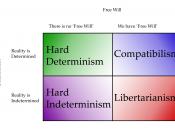Free will is defined as "the partial freedom of the agent, in acts of conscious choice, from the determining compulsion of heredity, environment and circumstance" (www.willdurant.com/glossary.htm).
In this paper I will ultimately attempt to show that the concept of free will as it is previously defined is in fact a false premise. The free will of any person to make any truly "free" decision is merely an illusory concept. To prove this position, I will first prove that "free will" and determinism are mutually exclusive concepts that cannot coexist, through analysis of Ayer's "Freedom and Necessity" and VanInwagen's "The Incompatibility of Free Will and Determinism". Second, I will prove that the actions of a person are influenced by factors independent and outside this person, namely, environmental influences and other "causes", and also within the person, with references to Chisholm's classic piece. Third and finally, I will respond to other arguments regarding the nature of free will, such as Bennett's article, while further developing my position.
By writing in this way I hope to reveal a type of determinism as the only plausible method of explaining why, for example, a boy chooses to buy a red bicycle instead of a blue one, and identifying the nature of these causal factors.
To begin with, Ayer asserts, essentially, that while some actions may be the result of an independent cause, there exists a certain degree of free will. His point is simple: That free will and determinism coexist, what is known as "soft determinism". Soft determinism maintains that free will exists despite certain constraints put upon human choice, and that "causality" is not necessarily in conflict with freedom, rather, constraint impels freedom. Peter Vaninwagen, however, argues that a certain agent "P" is necessarily free if and only if this agent has both...


